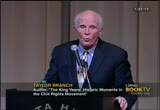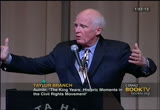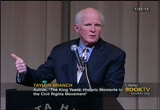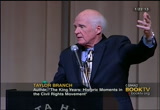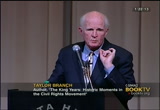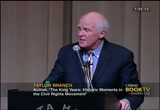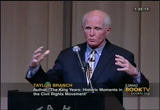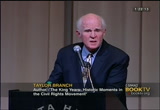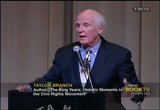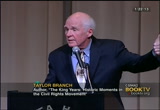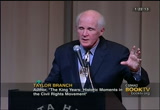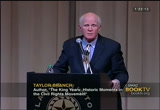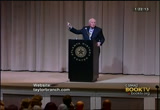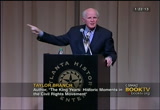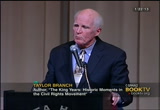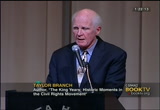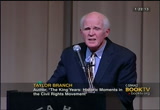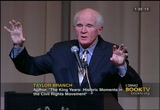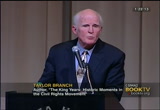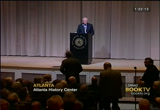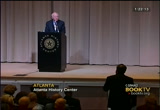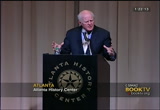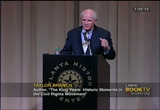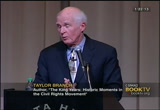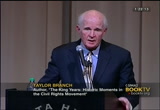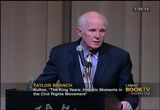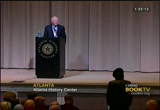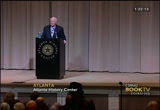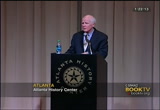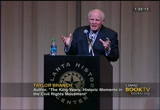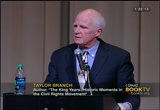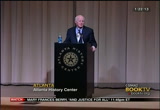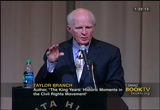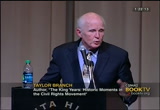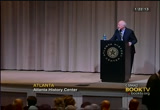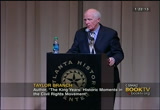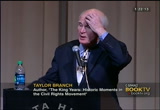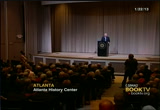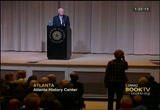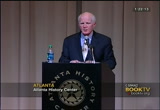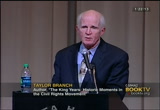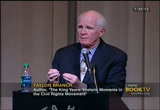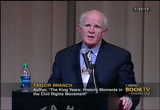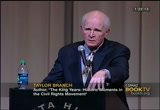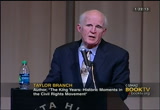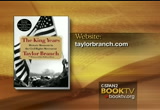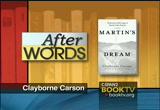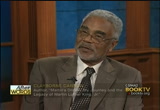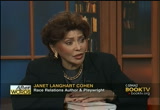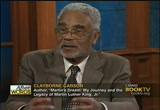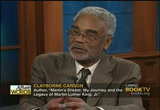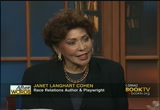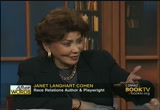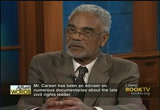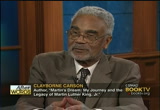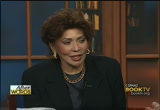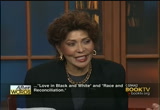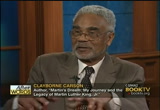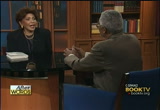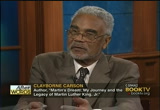tv Book TV CSPAN February 22, 2013 10:00pm-11:00pm EST
10:00 pm
i've got them on their backs now. we've got to open up the world. he repealed the national origins act, which was a racial hierarchy reserve 80% for people to become citizens to three countries. england, ireland and germany. he repealed that any first-come, first-served system for the whole world for legal immigrants ..
10:01 pm
all of us are in this together in this world, and in the long run, the korean communities come and indonesian communities are a strength for us. that bill was passed in 1965. i guarantee you that not one person in 100 who studies the civil rights movement understands that it is a third pillar within the building rights act of 1965 to build a structure that will be not only
10:02 pm
a great strength, but a great inspiration. it is essential for diversity and we have to learn how to get along with one another. we are unconscious to a lot of these things that are consequences of the freedom set in motion by this movement that struggle for eight years. finally he gets a nobel the nobel prize, and all of his staff says let's do this, and he says no, next week. and then he is back in jail. the mountaintop is nice, but the valley called. we are all blessed by that, but we are unconscious about it. the example of it, the example that i want to give you as to
10:03 pm
how great i think the disconnect is, is that george wallace made that speech in 1953, and he could not prevent any of these great tides are coming. if you have a daughter and you want your daughter to have the whole world open to her, your daughter and your hope stands on the shoulders of this civil rights movement. all of this happened that george wallace, while he could not prevent it, he was a genius at politics. in inventing the phrases that are chilling even today. when it was no longer respectable to corrupt the process and play on the fears and resentments of the process as it was let loose, saying that
10:04 pm
democrats were telling us how to do our duties on where we could go to school, and that they were in cahoots with a biased national media that had a racial agenda to help pointy headed liberals concentrate all effective power in the central government in washington. now, if any of that is familiar to you in contemporary politics, i submit that those phrases were invented by one of the great geniuses in modern politics and concentrated. on top of that, wallace had another part of this genus. he insisted in public that he had never made a single comment in his public career that reflected poorly on anyone because of race.
10:05 pm
he would get indignant if you suggested that. that is part of the formula. the wilco consciousness to the power of race in our society. it makes us blind slowly, so slowly and so pervasively that i think it is totally unconscious. people repeat those phrases because they are normal. they are normal from the right and from the lack. people do not understand how much the left has contributed to the same kind of modern cynicism that is not a credit for the type of capacity that we should have. if we could tackle all of those problems and let loose the thing at such a low cost, if we recover our sense of confidence and commitment and struggles to reach across the wind, that was the essence of the movement, that is the essence of martin luther king day.
10:06 pm
10:07 pm
optimistic sense and serious prh an economy that has been stripped of its industrial base and facing international competition. we have environmental problems, just as problems, all of these things in the bond that we can create. that is the essence of patriotism they were figuring out ways to set in motion these freedoms that strengthen everyone and increase the economy and the ties that bind and a convert to be able to sit here tonight. we need to be able to do it again, and in order to do that,
10:08 pm
we have to have a better sense. because our history is not just about where we sat in the steel. our history is about our future and what tools we will use to build strength across the alliance. it is not often that we misremember these relations that are involved. i think we should be ashamed of doing it on the left and right. a lot in the civil rights movement turned against their own example. that includes people in the civil rights movement, the most powerful idea was the first one that was abandoned. there were a lot of other
10:09 pm
religions as well. the law turned against religion. it was half of the movement inspiration and half of doctor king's magnificent formula of equal service and equal votes. 1 foot in the scriptures and 1 foot in the constitution. the next thing you know. people are turning against the spiritual base of democracy. when i grow, the textbooks of the civil war had nothing to do with slavery. we have a lot of sentimental on with gone with the wind, and to this day, there are textbooks in history that refer to the political movement that oversaw the reconstruction governments and the supremacy in the south and pave the way for segregation, the textbooks refer to that movement as the
10:10 pm
redeemers. saying that redeemed this by terrorism, when it is not among us. so it hasn't the ability to turn our perception upside down. it can also turn our politics upside down. i put two chapters together in about 1964. it had a democratic convention and the republican convention. the republicans were the party of lincoln. meeting in san francisco. they normally had over 20% of their delegates they only have
10:11 pm
13 delegates, he kicked them all out. barry goldwater met with two of them and announced that he was going to vote against the civil rights act of 1964 not for racial reasons, but because it was part of states rights. instantly, the first southern republican to explain that on the ground, i didn't even know any republicans my way. we have solid south democrats. and there was not one single member of the republican party. except for george bush the elder, who was at the atlantic ocean. not one.
10:12 pm
not only to dominate a brand-new southern republican party, but to dominate the national republican party along the lines of the language that george wallace had invented and handed over to them. that same year, lyndon johnson met in atlantic city. and to me, it is amazing that there is not more news. i have written in detail. he had a nervous breakdown, because he is trying to help to delegates from mississippi, to see all of the regular white democrats were publicly pledging to vote for goldwater. democratic delegates were set to sent to vote for goldwater and most of them started switching parties instantly. the mississippi freedom democrats, they walked out because they didn't think it was
10:13 pm
fair. and in one of the conversations you can hear, john conley called him and told him that if you even let those two symbolics and this, you will be turning the democratic party and letting martin luther king decide who can be a democrat. johnson almost has a breakdown and he basically went to bed for several days and said that i will quit. i can't handle this, i'm trying to turn the democratic party slowly toward a party that will represent us. and he told carl sanders that you and i cannot survive in our modern life. you and i cannot survive to win this election. we have to let them vote and eat
10:14 pm
and these folks don't do it. he said what good am i? i have passed this bill, and it looks like it can do anything. what i am saying is that race without any public acknowledgment, either them or largely in history today turned the partisan structure of the united states upside down in one summer. it is still that way, it is still not talked about. what i am saying that what i have learned from studying this movement all this time against my will, because the power jacks into its, for frederick douglass to martin luther king, to barack obama today, magnificent
10:15 pm
progress that is going forward. we changed, we are more accepting, it is still largely on their terms. the people on the other side was to accommodate. including barack obama come he can't talk about race because the voters will find some reason to be on tenterhooks about that. he can pay enormous dividends and to me it is vital that we get a sense of history with what actually happens, so we can restore our capacity to move
10:16 pm
forward. i'm not saying that it's going to be easy, but i think that it is beginning to happen. we have five years of anniversaries of things that are great lessons, not only for black people, but for those in the democracy if we understand what it is doing, and it is a vital task, whether it doesn't happen automatically, it it begins and the great thing is that it shows the promise of democracy comes when you have a movement, which means that you're actually watching where do they stand. sometimes the elected representatives will inspire you to witty response rate that you need both of those things coming together. in order to do that, you have to
10:17 pm
have a sense of history. in 1964, this is the kind of thing that is the focus in of history. i said that i was going to be sure, and i was longer than i wanted to be, there are plenty of questions about this because i'm trying to have something in a broad scale about a novel experiment to address something that i think is coming up next five years. we've painted ourselves into a corner. lots of people believe that if the shotgun and the cosmonaut
10:18 pm
the ties that bind us in the great american democracy. it could be true, and it is important to be vigilant against turning, but it is also important and that more important to stretch yourself to understand the true promise of our history, because it's not obvious that it's not easy for anyone. i have most of my life working on it, and i commend it to you, and let me stop there and i will take the questions that you have. thank you for having me.
10:19 pm
>> i'm curious to get your perspective. one area that has evolved since the civil rights is that we have since shown that we have become a majority minority nation. not only do you have different people from different ethnic groups, but a lot of blended babies that have come to this nation. you have an african-american president and you also have a president who i think gave a very good speech yesterday, very optimistic about the future. you touch on this area of looking at our brothers and sisters, to make sure that they have the same opportunities as everyone else. the younger generation that you are targeting, this is the world they have grown up in. they haven't seen the things of the 60s. what lessons do you tell these teachers that you want to transform and give them you to you can take and evolve as good american citizens that you're trying to kind of bring across? >> well, that's a very good
10:20 pm
question. i think you'll find that one of the lessons is that there are many different kinds of leadership. as i said, doctor king said that he was at times behind this. really three of my 18 chapters here and most people don't even know about them. he is almost a polar model. the follow me, standing up on top of the mountains, he is very quiet, he is mystical, he is the grassroots person and he basically says i want to follow you, but i'm willing to go to the courthouse, even if we are both going to get beaten. and arrested and jailed. lots of different kinds of models of leadership. one thing is people today need
10:21 pm
to know the serious problems of the 1960s. but the issues were so great that most adults in that period had opposed, but really that it was a total fake and people were concerned with what to do with it. if you are talking about looking a problem in the eye and finding out what to do, most of the adult leadership in the 1960s was looking at it. certainly not in the eye, but the fact can have kids step forward and you never know when your lifecycle protesting moment will be. it is one of many lessons. the first chapter of this book i spent lots of times trying to figure out how to begin. and i began with begin with the
10:22 pm
first speech of doctor king on monday after the bus boycott. and then he says he can't eat dinner because these folks just made me head of this protest committee because they did not expect it to do anything. and he had to decide what to say. he walked in there totally unprepared, most of the people are strangers. he is new in the community, only 26 years old, and you can see him and hear him in the speech, stumbling around to make a connection to an audience that he doesn't really know. when he does make a connection, you can hear it. i mean, i believe that if you listen to this and i hope they will let you listen, you can hear the moment in which strangers responded to things he was trying to say in a way that
10:23 pm
became a wave. nobody had any sense that that was historic. that is one a movement is literally historic. you can feel it being born. so i would say includes reaching outside themselves over what is important for them. and that is a history of this movement that shows that it can change, and i would say robert kennedy as the primary example of that. somebody who has not studied
10:24 pm
that much today. if you look at him over the course of his career, but liberated him from a pretty hard-nosed cold war politician. somebody who could go in to mississippi and sit down and talk to him about what they were eating and talk about hunger. that was a transformation with people like him. the chief doorway or for profoundest change has been when people go through across the barriers of race. good things happen when you do. is there anybody else?
10:25 pm
>> some of the mixed memories for alabama, when george wallace was making those proclamations in 1963 in mobile, alabama, spring hill college has been disaggregated since 1954. the change in my life came in 1954. when this first time that i had to pay, somehow i lost that received over the years, not really hurts me. but i think that might change came, and of course it was a catholic school, it was a jesuit school. people asked me how did you feel. i said that i felt like any other freshman going to school.
10:26 pm
i was more involved and what i was going to wear and what i was going to do. but i remember every african-american in my class, and there were many beyond it. and they were handpicked. but the school has grown and so it started in alabama. again, i remember a picture of george wallace on the front cover of the the new york magaz. he was dressed like the statue of liberty. he was talking about rednecks in new york. [laughter] [applause] i appreciate your work. it is very commendable.
10:27 pm
i appreciate you doing it. vincent harding wrote a book called killing an inconvenient hero. and i would like to hear your thoughts with the memory of doctor king. there are now full-page ads by the corporations and such. so i'm wondering how much doctor king has been sanitized. how much we need to remember what you have been talking about. i would be interested in hearing what you think. what doctor king would think of us and where we are in the culture where we should go. >> being realistic, george washington, abraham lincoln, all of them are part of this. it is not a crime. but the danger is when people unconsciously sanitize them to make them more comfortable to him. if that is what you want to
10:28 pm
hear. i have lots and lots of people who say we should not be talking about race but the content of character. i say that that is absolutely right. he reached across the boundaries so that he could see character. he was willing to go into the southern baptist seminaries where they voted not to hear his beach if you make those efforts, and you are talking about character, you understand the meaning of race and you won't need to talk about it so much. but to say that blindly i don't need to be talking about this,
10:29 pm
10:30 pm
so much of the world is still in flames burn. yes, ma'am. >> you seem to have a sense of stark reality that might happen if america doesn't reclaim that sense of history regarding so what you see in the next several years as the future of america involves getting the changing am i asking the question? >> yes, ma'am. if you study history, sometimes it takes catastrophes to get people to wake up as big a catastrophe as you could ask for
10:31 pm
and a century of segregation was a catastrophe but most of the world was unconscious and don't remember that history. if we don't rebuild our sense of capital and faith in one another we will have a number of problems with poor education, how to adapt economically that could cause all kind of central problems in the united states so that's the great thing about it. that's one reason we should be so grateful to dr. king and not see him as a leader for black folks but for fairness and dealing with the most troublesome problems we have in that method. if we do that, we have a chance to address these problems before they become acute and we have
10:32 pm
terrible social dislocations and yes i think these are serious issues. i think the health of data democracy it's no joke we sit around and say we are totally dysfunctional. what i'm hoping is some of that comes out of the culture and if we have a sense of cynicism about politics and don't see politics starts with you and me and what we are going to do and who we are going to talk to tomorrow and how far we're going to reach for any of the problems of threaten the country and we can risk that sort of social dislocation that could be catastrophic. i don't care whether you're talking about the environment, the economy, education, the present system more just system and on and on. we have a large number. at the ngo movement,
10:33 pm
non-governmental organization, the public interest movement are diverse and didn't exist very much years ago. what it doesn't have is a cohesive sense creating some sense of movement is that we are indebted to our history if it is more accurate. so i think history is about the future and that if the future is dangerous, then it will be less dangerous and more hopeful with a better sense that we have of our history. by any historian i guess you could expect me to say that. i'm trying to put it in a different way. yes, ma'am. >> i want to thank you for the wonderful work that you are doing. i have grandchildren i definitely want to share it with. my question is about another age group. as i look around this room i see
10:34 pm
a number of white males of this age who lived through much of the times that you're talking about at some level or another. i'm curious to know what is the response to your work from these men. from white males primarily or of that generation. >> i think the ones who read it and come talk to me are pretty good. [laughter] but i don't know how big of a sample that is of the larger population. i am preaching to the choir. but i will say that some of my -- doing this work puts me largely in the black community for the research. the time i interact with people
10:35 pm
is when the books are out and i will say that not exclusively but this is a cross-cultural history. i had to interview as many people in lyndon johnson's's administration than martin luther king. but when the books come out and i try to talk to people, anybody that's read it, some of my most inspirational responses have been from older white men. women are better quite frankly. [laughter] but what we get something from a white man, it is all the more to it and in the movement is basically run by women as long as there wasn't a microphone. but that is just a truism of
10:36 pm
history and to some degree it is still true. i don't know how that will survive the digital age when they can do a lot of stuff just for their computer and they don't have to go out. >> man, before you leave, please come down here. i would like to answer your question. >> i was a young man in my thirties during the civil rights movement the constant chez my feelings that i kept my mouth shut. i think i'm not unique in this group. there was an intellectual debate that went on, discussion america
10:37 pm
10:38 pm
about the unconsciousness. when he talks about race as a challenge i would like you to reflect on what your team has been today and this whole idea of race in the 21st century. and then my second question has to do more with your book and the 18 chapters, how do you get to that, did you say i'm going to do 18 or it can now to be 18 and i see this in the book. >> to answer the second part first i don't have 18 in mind. i wanted to pick out the ones i felt our e essential to communicate to this sweep of it, not all the particulars and please somebody said i am sorry
10:39 pm
you had to distill or abbreviate they are not going anywhere. they are still there. they want to know more about it but there are lots and lots of books that were cited. it is a universe largely uncovered by hollywood by the way for 25 years trying to get the story made into film they want to show and they are afraid of showing anything that will make viewers felt there on the right side therefore they can't show the people in the movement themselves in conflict and that's what's real so they don't
10:40 pm
dewitt. i wound up with the team because that was the stan and i would say martin luther king, the first chapters about him and the last chapters, but the 16 in-between and maybe half of it are mostly about king and the freedom ride is the only event that has two chapters, and i think it's that significant because the freedom rides the movement starts small and grows in scope than the definition in their identity and the way people think of themselves. the freedom ride where young people expanding the scope of a movement is based and thought it was something they were doing while there were getting their
10:41 pm
degrees in the and they said this is what i do i'm willing to grow anywhere to work on it. and so in many respect said expanded so i have two stories about the freedom ride starring diane - by and large who is probably the most overlooked central figure in that period. so it cannot the stories cannot be 18 and when i did it i felt i could boil down the adjusted debt to give people a sense of it. you can't do it let's see if you can do it under 300. i'm very proud of this.
10:42 pm
i did it in under 200. [laughter] people say we are so out this ought to make us feel good about what we can do we don't talk more about race i forgot what you said at the beginning to read the problem of the 21st century is still the color line, too. it didn't go away. the world was still colonized it was colonized during that time and was literally by the european nations we don't want
10:43 pm
to have an empire but we are going into a superpower. in that sense it did make for the colonization and the race and segregation in the united states and the legacy of slavery, a global problem we are still dealing with a lot of truth in the person still paying and the dislocation today for anyplace in the world the british or french diplomat drew a line on the map at the end of the 19th century whether it was creating a lot or syria or all the nations in africa we are still paying the price for that.
10:44 pm
economics are coming together but if you are talking about the division that causes people to start thinking like enemies. >> thanks for being with us tonight. assigning books in the library and the ludington foundation for sponsoring this lecture. [laughter] [applause] at age 25 she was one of the wealthiest in the colonies and
10:45 pm
during the revolution while in her mid-40s she was considered an enemy by the british who threatened to take her hostage. later she would become the nation's first lady at age 57. meet martelle washington in the first program of c-span's new weekly series first lady's influence and image. we will visit some of the places that influenced her life including colonial williamsburg, mount vernon, valley forge in philadelphia and be part of the conversation about martha washington with phone calls and facebook posts live monday night at eight eastern on c-span, c-span radio and c-span.org. up next "after words" with guest host author janet.t langht this week historian clayborne carson and he recounts his it hv journey from teenage civil rights activist present at the
10:46 pm
1963 marchre on washington to editor of martin luther king jr.'s papers. kinkos counters the organizerseo and the civilunte rights movemet and putting stokely carmichael and the king family. it's about an hour >> host: dr. person thanks for joining me on "after words."memr your book is a memoir and a history book.. peal jouook to talk about your personal journey. i get very candid about your life and you also cover new insights as a historian to the life and legacy of dr. martin luther king jr..you to writehe what prompted you to write the book this way? >> guest: i wanted to write something for the 50th anniversary .coming-oage.
10:47 pm
it's like coming of age, so our life had been connected to the king legacy and i felt there wa eomething about my life thatoutf needed to be told to understandg how king impacted me and how we got involved in this amazing >> h it's >> host: it is an excellent reading and we are of the samend generation. and i too coming of age in the 60's and the book was a bittersweety for me. dr. king was my mentor.knew i knew him the last two years of his life and because of the way he was taken from us because ofi al hatreatred in this country. we cod uld start at the beginnid because the beginning of yourt b book you are on the mall with
10:48 pm
dr. king, and near the end of your book you are all normal again 50 years later with his you helped monument which you have to design. >> guest: and in between coming back for many times on an important occasion to the mall. it seems like even though i lived in washington for a short time, thmalleeme be a even the beloved in washington a short time it seems to be a place that had such great life.ic meaning for my >> host: and sentimental.come be all these memories. >> host: you were 19 years old in 1963 and you are on the mall in the march in washington where dr. king gave that iconic speech, gates -- i have a dream. how did you happen to go there? >> guest: part of of it was i grew up in a small town where there weren't very many black people. they were three black families growing up in southern new mexico so i was fascinated by what was the black community like and i didn't have very much
10:49 pm
exposure to it. except on visits to my relatives into trite. so i think i learned about the black community through the black struggle. i would pick up my newspaper and there was martin luther king and the little rock nine. there are the students in the citizens. >> host: sncc's. >> guest: yes neck and they became my role model and by 1963 i'm in college. i get to go to the student meeting, the national student association meeting in indianapolis. in bloomington actually and i meet stokely carmichael and you know he is the first person that i talk to and i remember when i told them that i wanted to go to the margin he just dismissed that and how could you think
10:50 pm
about going to that? >> host: why? was he it detractor of dr. king or this method's? >> guest: he didn't say that in terms of martin luther king. martin luther king was just one of the people that would be a good march. for me, he felt that i should be in albany georgia or cambridge maryland. he was at howard university of the time and he would be going to those places where there was activism. >> host: in danger. >> guest: instead of going to a one day march. it just wasn't what he had a mind and i think he was trying to recruit me into the movement. but for me going to a one day march would be the most exciting and radical thing i had done in my life at that point. >> host: i want to talk more about stokely but let's go back to the march. you were there when he gave that address. what did you think of the speech? did you think it would be iconic like the gettysburg address or fdr's speech? >> guest: no, not that point.
10:51 pm
for those of us who were there it was the final speech in a long day of speeches so yes i was very pleased to see martin luther king in person. i had heard about him and everyone kind of looks forward to what was martin luther king going to say because he had already been noted as a great orator, but his speech was very short. it wasn't one of his long-winded long-winded -- he spoke for an hour or so. this was 15 or 16 minutes and it wasn't -- actually it was planned to be less that seven or eight minutes. that is what he actually wrote out his speech to be. >> host: why was it longer? did he decide to add -- tell that story. >> guest: one of the things i tell about later that i didn't know then was that when he got his repaired remarks he's
10:52 pm
thought this occasion requires something more and he laid out a new objective and now i can look at these advanced text. he's talking about don't go back to the south. go back to these places and taken the protest but then he thought the occasion required something more. >> host: a little gravitas. >> guest: he had been talking about this dream that he had any talked about it for years, the american dream and it had become his dream and he had been in detroit just a few months before. he had talked about, i have a dream and america will someday realize these principles in the declaration of independence. so i think he was just inspired by that moment. >> host: you know amerigroup there was talk of heavy jackson that was there. >> guest: yes, and i listened
10:53 pm
to lots of recordings of that speech. i had never quite heard that. maybe she allowed stage whispering and i want to believe that story. >> host: she loved him. the reason i'm at dr. king was because i was staying at her home in chicago as a young girl and dr. king would come by there and as a matter of fact i met him the day after he was hit in the head at guage part. remember the story click to talk about the story about him getting hit in the head in illinois. did you meet dr. king. >> guest: i only saw him from a distance. >> host: how close were you? >> guest: i tried to get as close as i could about a foot from the lincoln memorial but the notion as a 19-year-old that i would actually shake hands with him, that would have been
10:54 pm
the thrill of my life. i only saw him speak twice and both times i saw him as a member of the crowd. he came to ucla when i was student there and spoke so that was the other time. this was maybe 1965 something like that. >> host: how did that impact you? you have this long jersey on -- journey on the way home. >> guest: i didn't have a way the way back i didn't tell my parents i was coming. i went back to indianapolis and so then i just had to hitchhike and i decided to cross the country. >> host: was i scared -- were you scared? >> guest: of course i was scared. >> host: how did hearing dr. king's speech that day impact you on how stokely was trying to influence you because you had talked to stokely afterwards. >> guest: no, before.
10:55 pm
not afterwards. it was probably three years before i talk to him again and by that time -- in 1963 he was not a well nonpublic figure. in 1966 he was the african black power and so that is the next time we got back in touch with each other again in the from the point on i stayed in touch with them for the rest of his life. >> host: i want to talk about him somewhere. stokely carmichael is one of my heroes as well as malcolm x. i was more in agreement with malcolm x, the later malcolm x and stokely carmichael then i was with dr. king despite knowing him and later i had gotten older and i appreciated dr. king's tactics. he was the one with the monument on the mall but during that time you had misgivings about "time" magazine naming dr. king man of the year.
10:56 pm
>> guest: no, no, not at all. i was from a distance very proud of martin luther king but i think i absorb a lot of resentment of him. the people in snake and i felt this way. martin luther king is following us. we are not following him. he is the one -- we are out there trying to break it down in terms for me it was moving to los angeles in getting involved in the movement there and getting involved with a group called non-violent action committee which is a sncc group at the local level in getting involved with issues like employment issues and urban issues. this was the year before king comes to chicago so we are already from our perspective, king is following us in catching up in the same of the vietnam war, that we were very involved in opposing the war from an
10:57 pm
early stage and king was much more -- because he had much more to lose. >> host: and he lost elected and he? and being against the vietnam war. >> guest: one of the things i discovered is it's much easier for a 20 or a 21-year-old student to take a stand on anything when you don't have anything to lose except maybe your draft status which i did lose. and you know so for king of the understood that everything he had accomplished on the civil rights agenda, all of that was contingent on not taking a stand on vietnam. >> host: president johnson was very upset with dr. king because he felt, we handed several rights and voting rights over and now you are going to go against me. i'm up for re-election and you are going to go against me on the vietnam war.
10:58 pm
>> guest: yeah. now i understand what courage it took to take the stand that he did and i understand more about why he hesitated. coretta was very much involved in the antiwar movement from an earlier stage but again she was not a public figure so he could send her to essentially speak for him. >> host: again he proved dr. king right. >> guest: i think so. i think he is a visionary. i think he understood the connection between the anti-colonial movements that were going on around the world and understood how the cold war had prevented us from saying that we were on the wrong side, that because the communist movement had identified itself with anti-colonialism, many of
10:59 pm
these nationalist wanted to have the assistance of the soviet union so we sought entirely in cold war terms. >> host: my enemy's enemy is my friend. you were in the country during the vietnam era. why? >> guest: you know for me looking back it wasn't that difficult a choice because i knew i wasn't going to go into the military. >> host: how did you know you weren't going to go? redrafted? >> guest: i was drafted several times actually. i appealed to be as conscientious objector and that was turned down so it was really coming down to do i want to go to prison for three years or do i want to explore the world's? so i recognize that if i had left i might not be able to ever come back. >> host: what did you think about that? when w
91 Views
IN COLLECTIONS
CSPAN2 Television Archive
Television Archive  Television Archive News Search Service
Television Archive News Search Service 
Uploaded by TV Archive on

 Live Music Archive
Live Music Archive Librivox Free Audio
Librivox Free Audio Metropolitan Museum
Metropolitan Museum Cleveland Museum of Art
Cleveland Museum of Art Internet Arcade
Internet Arcade Console Living Room
Console Living Room Books to Borrow
Books to Borrow Open Library
Open Library TV News
TV News Understanding 9/11
Understanding 9/11